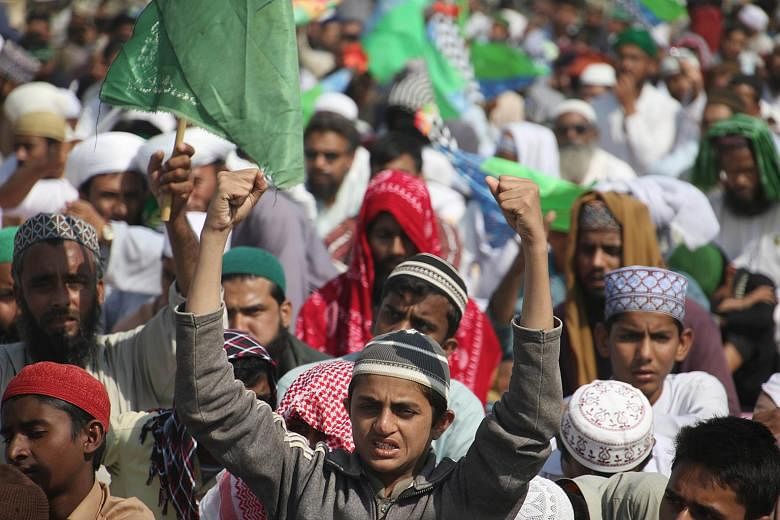ISLAMABAD (Reuters, NYTimes) - A Pakistani hardline Islamist group whose supporters clashed with police over the weekend called off its weeks-long protest after the government agreed to its demands and the law minister resigned, the group's spokesman said on Monday (Nov 27).
Seven people were killed and 200 wounded in the clashes near Islamabad after a police bid to disperse the protesters failed on Saturday, sparking demonstrations in other major cites nationwide.
"Our main demand has been accepted," Ejaz Ashrafi, spokesman of the Tahreek-e-Labaik group, told Reuters. "The government will announce the law minister's resignation and we will end our sit-in today."
Law minister Zahid Hamid has resigned, state-run news channel PTV said on Monday. Shipping containers that police had used to block off the main protest site near the capital were being removed, media said.
The government on Saturday called in Pakistan's powerful military to tackle the protests after the police operation failed. Troops were deployed late on Sunday to help restore law and order to the capital, officials said.
The move came after the prime minister and army officials held emergency talks and agreed to send troops to protect vital areas and buildings like Parliament, the prime minister's residence and the diplomatic enclave that houses embassies.
The military informed the governing party, Pakistan Muslim League-Nawaz, that it would rule out the use of lethal force to quell the protest, according to the terms of the deployment in a letter that was shared with The New York Times and circulated by the local news media.
The protests erupted over two weeks ago, when the cleric, Khadim Hussain Rizvi, accused law minister Mr Hamid of committing blasphemy after the governing party proposed a new version of an oath for lawmakers that dealt with a declaration of Prophet Muhammad as God's final prophet.
Activists of Tehreek-e-Labaik said the words "I believe", used to replace the clause "I solemnly swear" in a proclamation of Muhammad as the religion's last prophet amounted to blasphemy.
The law minister denied the blasphemy charge, even releasing a video in which he emphatically stated that he believed that Muhammad was God's final prophet. The government also reversed the changes in the oath. But the efforts failed to placate Mr Rizvi and several other religious leaders.

